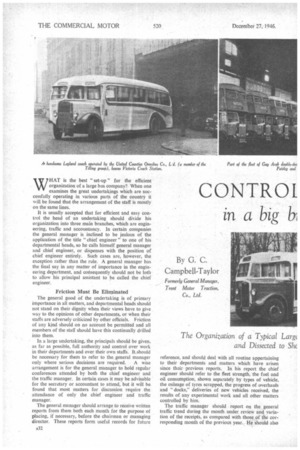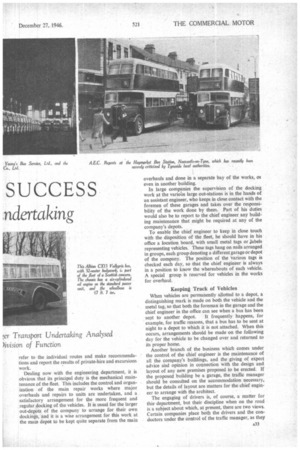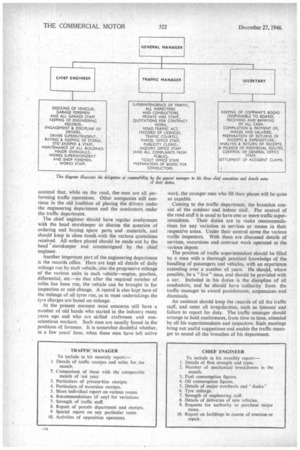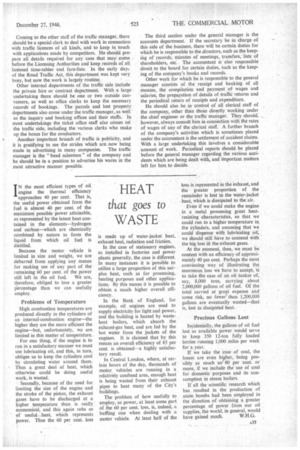CONTROI SUCCESS
Page 34

Page 35

Page 36

Page 37

If you've noticed an error in this article please click here to report it so we can fix it.
in a big 1)1
rndertaking
WHAT is the best " set-up " for the efficient organization of a large bus company? When one examines the great undertakings which are successfully operating in various parts of the country it will be found that the arrangement of the staff is mostly on the same lines.
It is usually accepted that for efficient and easy control the head of an undertaking should divide his organization into three main branches, which are engineering, traffic and accountancy. In certain companies the general manager is inclined to be jealous of the application of the title "chief engineer" to one of his departmental heads, so he calls himself general manager and chief engineer, or dispenses with the position of chief engineer entirely. Such cases are, however, the exception rather than the rule. A general manager has the final say in any matter of importance in the engineering department, and consequently should not be loth to allow his principal assistant to be called the chief engineer.
Friction Must Be Eliminated
The general good of the undertaking is of primary importance in all matters, and departmental heads should not stand on their dignity when their views have to give way to the opinions of other departments, or when their staffs are adversely criticized by other officials. Friction of any kind should on no account be permitted and all members of the staff should have this continually drilled into them.
In a large undertaking, the principals should be given, as far as possible, full authority and control over work in their departments and over their own staffs. It should be necessary for them to refer to the general manager only where serious decisions are required. A wise arrangement is for the general manager to hold regular conferences attended by both the chief engineer and the traffic manager. In certain cases it may be advisable for the secretary or accountant to attend, but it will be found that most matters for discussion require the attendance of only the chief engineer and traffic manager.
The general manager should arrange to receive written reports from them both each month for the purpose of placing, if necessary, before the chairman or managing director. These reports form useful records for future reference, and should deal with all routine appertaining to their departments and matters which have arisen since their previous reports. In his report the chief engineer should refer to the fleet strength, the fuel and oil consumption, shown separately by types of vehicle, the mileage of tyres scrapped. the progress of overhauls and "docks," deliveries of new vehicles received, the results of any experimental work and all other matters controlled by him.
The traffic manager should report on the general traffic trend during the month under review and variation of the receipts, as compared with those of the corresponding month of the previous year. He should also
refer to the individual routes and make recommendations and report the results of private-hire and excursions work.
Dealing now with the engineering department, it is obvious that its principal duty is the mechanical maintenance of the fleet. This includes the control and organization of the main repair works where major overhauls and repairs to units are undertaken, and a satisfactory arrangement for the more frequent and regular docking of the vehicles. It is usual for the larger out-depots of the company to arrange for their own dockings, and it is a wise arrangement for this work at the main depot to be kept quite separate from the main overhauls and done in a separate bay of the works, ot even in another building.
In large companies the supervision of the docking work at the various large out-stations is in the hands of an assistant engineer, who keeps in close contact with the foremen of these garages and takes over the responsibility of the work done by them. Part of his duties would also be to report to the chief engineer any building maintenance that might be required at any of the company's depots.
To enable the chief engineer to keep in close touch with the disposition of the fleet, he should have in his office a location board, with small metal tags or jabels representing vehicles. These tags hang on nails arranged in groups, each group denoting a different garage or depot of the company. The position of the various tags is checked each day, so that the chief engineer is always in a position to know the whereabouts of each vehicle. A special group is reserved for vehicles in the works for overhaul.
Keeping Track of Vehicles
When vehicles are permanently allotted to a depot, a distinguishing mark is made on both the vehicle and the metal tag, so that both the foreman in the garage and the chief engineer in the office can see when a bus has been sent to another depot. It frequently happens, for example, for traffic reasons, that a bus has to be sent at night to a depot to which it is not attached. When this occurs, arrangements should be made on the following day for the vehicle to be changed over and returned to its proper home.
Another branch of the business which comes under the control of the chief engineer is the maintenance of all the company's buildings, and the giving of expert advice and opinion in connection with the design and layout of any new premises proposed to be erected. If the proposed building be a garage, the traffic manager should be consulted on the accommodation necessary, but the details of layout are matters for the chief engineer to arrange with the architect.
The engaging of drivers is, of course, a matter for this department, but their discipline when on the road is a subject about which, at present, there are two views. Certain companies place both the drivers and the conductors under the control of the traffic manager, as they contend that, while on the road, the men are all performing traffic operations. Other companies still continue in the old tradition of placing the drivers under the engineering department and the conductors under the traffic department.
The chief engineer should have regular conferences with the head storekeeper to discuss the question of ordering and buying spare parts and materials, and should keep in close touch_with the various quotations received. All orders placed should be made out by the head • storekeeper and countersigned by the chief engineer.
Another important part of the engineering department is the records office. Here are kept all details of daily mileage run by each vehicle, also the progressive mileage of the various units in each vehicle—engine, gearbox, differential, etc.—so that after the required number of miles has been run, the vehicle can be brought in for inspection or unit change. A record is also kept here of the mileage of all tyres run, as in most undertakings the tyre charges are based on mileage.
At the present moment most concerns still have a number of old hands who started in the industry many years ago and who are skilled craftsmen and conscientious workers. Such men are usually found in the positions of foremen. It is somewhat doubtful whether, in a few years' time, when these men have left active work, the younger men who fill their places will be quite so capable.
Coming to the traffic department, the branches consist of the outdoor and indoor staff. For control of the road staff it is usual to have one or more traffic superintendents. Their duties are to make recommendations for any variation in services or routes in their respective areas. Under their control come the various traffic inspectors. With them are discussed details of services, excursions and contract work operated at the Various depots The position of traffic superintendent should be filled by a man with a thorough practical knowledge of the handling of passengers and vehicles, with an experience extending over a number of years. He should, where possible, be a "live" man, and should be provided with a car. Included in his duties is the discipline of all conductors, and he should have authority from the traffic manager to award punishments, suspensions and dismissals.
An assistant should keep the records of all the traffic staff, and enter all irregularities, such as lateness and failure to report for duty. The traffic manager should arrange to hold conferences, from time to time, attended by all his superintendents and inspectors. Such meetings bring out useful suggestions and enable the traffic manager to sound all the branches of his department.
Coming to the other staff of the traffic manager, there should be a special clerk to deal with work in connection with traffic licences of all kinds, and to keep in touch with applications made by competitors. He should prepare all details required for any case that may come before the Licensing Authorities and keep records of all licensed time-tables and fare-lists. In the early dayt. of the Road Traffic Act, this department was kept very busy, but now the work is largely routine.
Other internal departments of the traffic side include the private hire or contract department. With a large undertaking there should be one or two outside canvassers, as well as office clerks to keep the necessary records of bookings, The parcels and lost property departments also come under the traffic manager, as well as the inquiry and booking offices and their staffs. In most undertakings the ticket office staff also comes on the traffic side, including the various clerks who make up the boxes for the conductors.
Another important branch of traffic is publicity, and it is gratifying to see the strides which are, now being made in advertising in many companies. The traffic manager is the "head salesman" of the company and he should be in a position to advertise his wares in the most attractive manner possible. The third section under the general manager is the accounts department. If the secretary be in charge of this side of the business, there will be certain duties for which he is responsible to the directors, such as the keeping of records, minutes of meetings, transfers, lists of shareholders, etc. The accountant is also responsible direct to the board for certain duties, such as the keeping of the company's books and records.
Other work for which he is responsible to the general manager consists of the receipt and banking of all monies, the compilation and payment of wages and salaries, the preparation of details of traffic returns and the periodical return of receipts and expenditure.
He should also be in control of all clerical staff of the company, other than those directly working under the chief engineer or the traffic manager. They should; however, always consult him in connection with the rates of wages of any of the clerical staff. A further branch of the company's activities which is sometimes placed under the accountant is the settlement of accident claims. With a large undertaking this involves a considerable amount of work. Periodical reports should be placed before the general manager regarding the various accidents which are being dealt with, and important matters left for him to decide.




































































